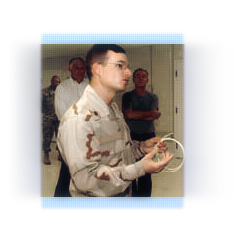|
|
 |
 |
DESTINATION GUANTANAMO BAY, CUBA
The Legitimacy of GTMO: An Eyewitness Report, Page 15
A Travel Journal by Dr. Eric A. Zillmer
Pacifico Professor of Psychology at Drexel University

< PREVIOUS SECTION | NEXT SECTION >
|
 |
 |
Lunch
0100

|
 |
We receive a boxed lunch similar to one that the detainees will be served that same day. Interestingly we are asked to pay $3.55 even though the entire GTMO trip must have cost the DoD tens of thousands of dollars. Military procurement! The meal consists of pasta with chicken, fresh salad with dressing, juice, water, an orange, and surprisingly two baklava. I only pick at the meal, but approve of the baklava, which are decent. We are informed that all detainees are provided with 4,200 calories per day. One detainee has, in fact, increased his weight from 215 to over 400 pounds.
In fact, the conversation quickly turns to how the medical staff and administration deals with hunger strikes. Hunger strikes are defined as missing over nine consecutive meals. But medical attention is not provided until strict and agreed upon medical guidelines that have been adopted by the correctional arena have been met. At the time of our visit only four detainees were on hunger strike and only two were receiving “nutritional support.”
Like many facts about GTMO, the issue of tube feeding has been distorted in the media and on the Internet. There have been reports that detainees are required to stand via restraints and that they are then forcefully fed in an unhealthy manner to coerce information. The Admiral assured us this was not so and that the scope of “nutritional support” was relatively non-invasive. This procedure is only initiated after its medical necessity has been substantiated, and only after a meal was presented and rejected by the detainee. The Admiral informed us that he had the feeding tube, which is approximately 1/8 inch in diameter, inserted through his nostril, to understand the mild discomfort that detainees are exposed to. Interestingly, through this procedure, the U.S. military is actually allowing the detainees to continue with their hunger strike by providing nutritional supplements, which sustains their life.
“Why don’t you just let them die?” The President of the American Psychiatric Association asked. “We believe in a culture of life,” the Admiral answered.
NEXT...
|
|
|